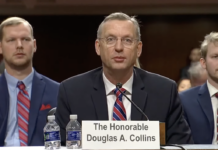
(GA Recorder) | The state Senate has now backed a bill that would block cities and counties from significantly cutting their local police department budgets from the prior year.
The proposal comes in response to the wave of social unrest and calls for policing reforms across the country last summer. Demonstrators often pushed for reallocating resources for social and mental health services.
Two Georgia cities – Athens and Atlanta – considered changes to how their police agencies were funded last year. Both measures failed to pass.
A version of the House bill cleared the Senate with a 36-to-15 vote Thursday. The changes made in the Senate will send it back to the House in the final days of this year’s legislative session.
“I think everyone sees the things that are going on around our country right now related to law enforcement,” said Sen. Randy Robertson, a Cataula Republican who sponsored the bill. “And what this does is just guarantee the citizens of any community, that they’re not caught up in the politics, that it revolves around policing and offers protection.”
Georgia House Speaker suggests State Patrol could take on Atlanta crime
But critics called the legislation, which would prohibit locals from cutting police departments by more than 5% from the prior year, an overreach by state government into local decision making. The Senate version includes several conditions where the House’s ban would not apply, such as when revenues are down more than 5%.
Under the latest version of the bill, local officials would also be able to cut their police department budget by more than the state-approved amount if the proposed reduction is publicly advertised and a vote is held in a public meeting.
“There was an outcry during the summer regarding Black Lives Matter and defunding the police,” said Sen. Emanuel Jones, a Decatur Democrat who opposed the measure. “Is this bill a reaction to those activities this past summer?”
Robertson rejected any direct connection to the protests and pointed instead to the proposals in Atlanta and Athens. In Atlanta, some council members unsuccessfully pushed to redirect about a third of the city’s police budget to social services. In Athens, two commissioners pressed to reduce the police budget by 50% over a decade.
Some Democrats supported Robertson’s bill, although begrudgingly.
Sen. Freddie Sims, a Dawson Democrat, voted for the bill but called it “a very slippery slope for us.”
“We certainly do not want to diminish relations with our public safety officials through funding discussions,” Sims said. “But what we have become starkly aware of is more funding for public safety, not less, is needed.”
But Sims also called for more intensive training for police officers, particularly in mental health awareness, diversity training, and community relations, and said it is important that police trainers come from more diverse backgrounds.







